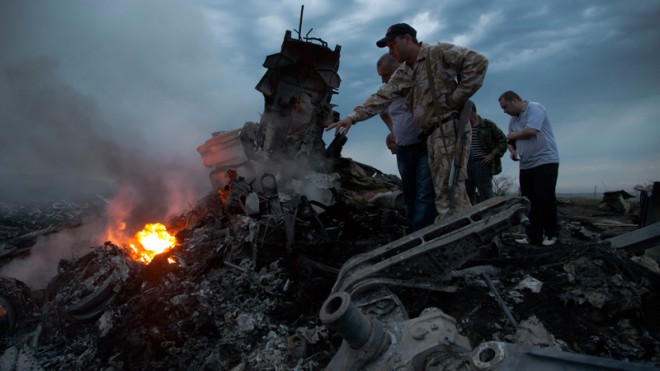
People inspect the crash site of a passenger plane near the village of Hrabove, Ukraine, Thursday, July 17, 2014. Ukraine said a passenger plane was shot down Thursday as it flew over the country, and both the government and the pro-Russia separatists fighting in the region denied any responsibility for downing the plane. (AP Photo/Dmitry Lovetsky)
SYDNEY— A prominent researcher, two activists and at least three others headed to an AIDS conference in Australia were on the Malaysian jetliner shot down over Ukraine, news that sparked an outpouring of grief across the scientific community.
Among the passengers were a former president of the International AIDS Society, Joep Lange, a well-known researcher from the Netherlands, and World Health Organization spokesman Glenn Thomas, based in Geneva.
Malaysia Airlines Flight 17 was flying from Amsterdam to Kuala Lumpur, Malaysia, when it crashed Thursday in eastern Ukraine. How many of the nearly 300 on board were headed to the conference wasn’t immediately known.
The 20th International AIDS conference starts Sunday in the Victoria state capital of Melbourne. Thousands of scientists and activists are expected to attend to discuss the latest developments in HIV and AIDS research.
The Academic Medical Center hospital in Amsterdam said in a statement that two of its staff, Lange and his colleague Jacqueline van Tongeren, were believed to have perished.
“Joep was a man who knew no barriers,” the hospital said. “He was a great inspiration for everybody who wanted to do something about the AIDS tragedy in Africa and Asia.”
Van Tongeren was head of communications at the Amsterdam Institute for Global Health and Development and had previously been an HIV-AIDS nurse, a University of Amsterdam statement said.
Lange was the institute’s executive scientific director.
Nobel laureate Dr. Francoise Barre-Sinoussi, co-discoverer of the AIDS virus and president of the International AIDS Society, paid tribute to Lange in a speech in the Australian capital, Canberra. The international society sponsors the AIDS conference
“Joep was a wonderful person — a great professional … but more than that, a wonderful human being,” she said. “If it is confirmed, it will be a terrible loss for all of us. I have no words, really, to try to express my sadness. I feel totally devastated.”
She later told reporters the conference would continue out of respect for the lives lost: “Because we know that it’s really what they would like us to do.”
Lange had been working on HIV since the earliest years of the epidemic, participating in clinical trials and research across the world, Barre-Sinoussi said. He had dedicated his life, she said, to “the benefit of mankind.”
Sharon Lewin, co-chair of the conference, called Lange a true renaissance man, who also had a keen interest in arts and literature.
“He was passionate about his job and passionate about global health and improving people’s lives in low-income countries,” she said.
WHO spokesman Glenn Thomas, who was en route to the conference, was also among the dead, said Christian Lindmeier, spokesman for WHO’s Western Pacific region.
“Everybody’s devastated,” Lindmeier said. “It’s a real blow.”
Also on board was Dutch activist Pim de Kuijer, once a political intern of former Dutch lawmaker Lousewies van der Laan. On Twitter, Van der Laan called him “a brilliant, inspiring and caring activist fighting for equality and helping AIDS victims around the world.”
The Amsterdam advocacy group Bridging the Gaps said on its website that its program manager, Martine de Schutter, was among the victims.
The International AIDS Society issued a statement Saturday confirming that Lucie van Mens was also on board. Van Mens worked for the Chicago-based Female Health Company, which makes female condoms.
Robin Weiss, an emeritus professor at University College London, said Lange’s death was comparable to that of Jonathan Mann, who led WHO’s first AIDS department. Mann died when his flight to Geneva crashed off Nova Scotia in 1998.
Weiss noted the AIDS community has grown much larger since then, lessening the impact of any one person’s death.
“It’s a moment of great sadness, but I don’t think (Lange’s) loss alone sets us back in the fight against AIDS. The momentum to continue is still there,” he said.
In a statement, Dr. Jennifer Cohn of Doctors Without Borders said the AIDS community would honor the loss by “re-doubling (their) commitment and efforts to address the HIV pandemic.”